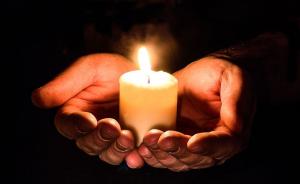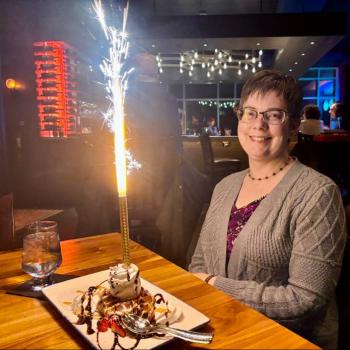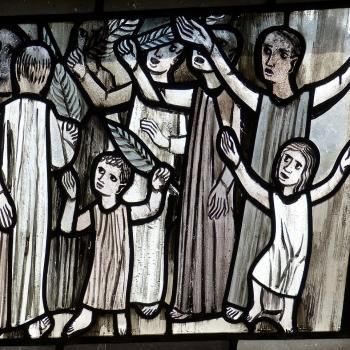In her spiritual memoir Still, Lauren Winner begins a brief chapter on prayer by noting that “it is easier to read about prayer than to pray” (tell me about it), then describes the results of a fifty-year-old study of children and prayer, the aim of which was to discover how children’s concepts of prayer evolve as they grow older.
The results of the study reveal a hierarchy similar to Kohlberg’s stages of moral development, in which children’s ideas about prayer become more and more sophisticated. The four-year-old’s notion that prayer is about God, rabbits, deer, Santa Claus, turkeys, Mary, and Mary’s baby, evolves through the seven-year-old’s idea that “prayer is when you ask for something you need,” to the twelve-year-old’s proto-theological belief that prayer is an attempt to communicate with God, particularly when seeking forgiveness.
Winner is particularly interested in the portion of the study where its authors note with approval that older children realize that they are “the author of their own prayer,” an improvement on the younger child’s belief that prayers “come from God, or from heaven, or from Fairyland in the sky.” But Winner is not sure that the older child’s realization is an improvement. As a person’s experience with prayer continues,
I think they will come to know that the youngest children are right. I think they will come to know that their prayers do not, in fact, come from within themselves. I can participate in prayer (or not), show up to pray (or not), but I am not the author of my prayers; when they come, they come from God.
In keeping with my frequent practice of free association, a four-decades-old memory bubbled to the surface.
Some forty years ago, I regularly sang in an Episcopal church choir. Since the church was the largest church in a college town, as well as the cathedral of the diocese, the music was slightly better than garden-variety church stuff, but the choir was still pretty much a mixed bag. There were five or six sopranos and an equal number of altos, including one close-to-professional quality ringer in each section. We had only two tenors, one a fellow over seventy years old who probably once had a good voice when he was younger and a much younger fellow who sang with gusto but was tone-deaf. The baritones (my section) were more numerous, usually at least four or five. I don’t have a good solo voice, but I am a good choir singer because I read music well and have good pitch. I was the guy all of the other baritones crowded around with a new piece in order to get things right.
One Easter season, our primary Easter Sunday piece was going to be Randall Thomson’s “Alleluia.” The words are easy—all you sing is “Alleluia” all the way through with one “Amen” on the end. The notes are moderately challenging, but this was by no means the most technically difficult piece the choir had ever sung. The piece is sung a capella; for it to work, the singers need the same sort of “oneness” that Gregorian chant requires—they have to become one voice, rather than fifteen or so individual ones. Furthermore, they have to stay in tune for five minutes without accompaniment. And it wasn’t happening.
After several mediocre attempts in rehearsal, Charles, our organist and choirmaster, yelled “STOP!” After regaining his composure, he said “the Bible says that around the throne of God, the cherubim and seraphim continually sing ‘Alleluia’ in never-ending praise. For the next five minutes let’s plug into that eternal song, joining ‘with angels and archangels and with all the company of heaven,’ just as the Sanctus from mass every Sunday says. Begin.” And for the next five minutes, that’s where we were. We left our individual, fragmented and discordant existences and joined “all the company of heaven who forever sing this hymn to proclaim the glory of your Name.” I still get chills as I remember and write about it all of these years later. As we ended Alleluia with a hushed “Amen,” our tone-deaf tenor said it all: “Whoa! Where did that come from?”
To my ears, there was nothing mystical or magical about our Easter morning performance a few days later. We were in tune, we didn’t embarrass ourselves, but we were not inspired. Afterwards, though, I overheard an old parishioner say to two of my fellow choristers that “you sang like angels today.” Maybe so, I thought. I know that we did at least once—maybe on Easter morning, she was the one who had “ears to hear.” I have the gnawing suspicion that this transcendence is there all the time. I’m grateful when, every once in a while, I can say “surely God was in this place” and mean it.
This may not be what Lauren Winner means when she writes in Still that “I can participate in prayer (or not), show up to pray (or not), but I am not the author of my prayers; when they come, they come from God,” but I like the idea of prayer not being something that each of us has to strive to construct, create, or “do.” Just as my choir plugged, almost accidentally, into a river of praise that is always flowing, regardless of whether we tune in or not, perhaps when we pray we are opening ourselves to a river of transcendence and sacrament that is always there, whether we notice it or not. Prayer then becomes something I become more and more aware of by becoming a person more carefully attuned to the sacred. Perhaps prayer is something that is done to me rather than something that I do.

















